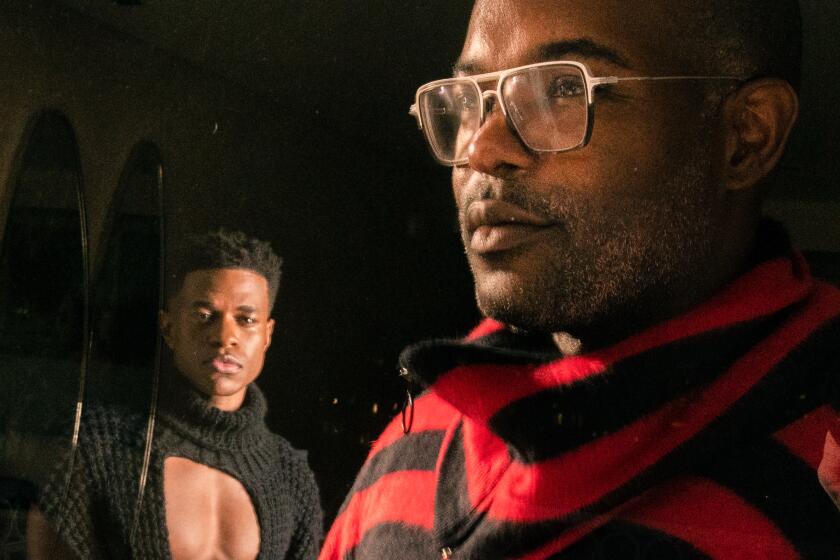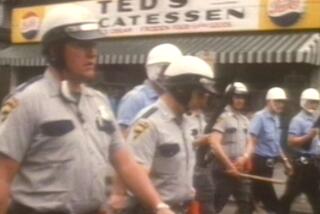Review: ‘The Inspection’ is a strikingly personal portrait of the military under ‘don’t ask, don’t tell’
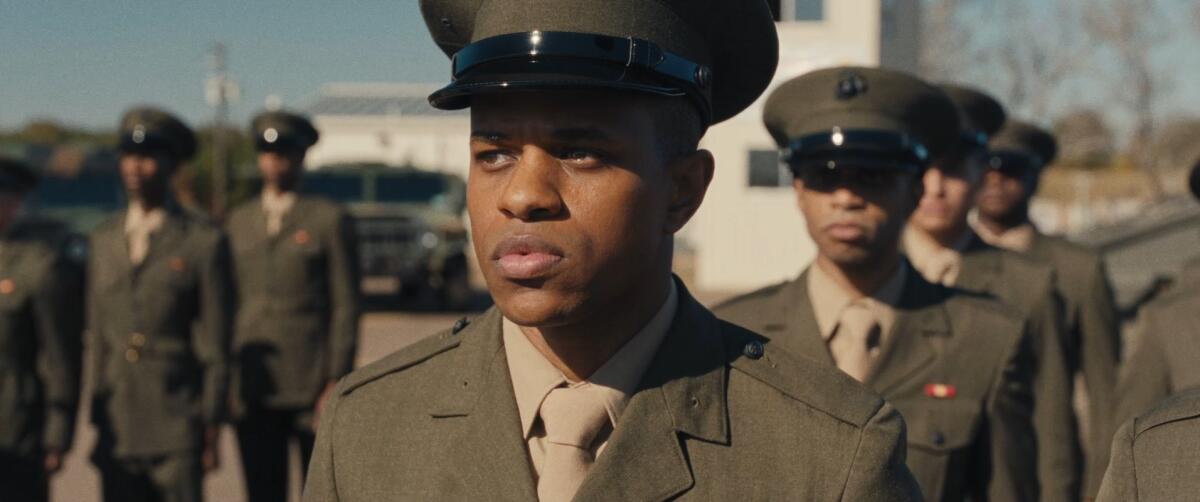
At the beginning of “The Inspection,” Elegance Bratton’s stirringly intimate drama about a gay Black man in the U.S. military, one personal hell is exchanged for another. The man’s name is Ellis (he’s played by Jeremy Pope), though as a Marine recruit, he’s referred to most often by his surname, French — a single syllable that, as barked repeatedly by his superiors and fellow recruits, begins to sound like a taunt. It’s 2005, and with “don’t ask, don’t tell” still very much in effect, Ellis’ boot camp experience becomes that much more nightmarish a crucible. It also opens a window into a hyper-regimented world that, as one drill sergeant observes in a rare unguarded moment, couldn’t exist without the gay servicepeople whose very existence it denies.
In the debut feature ‘The Inspection,’ Elegance Bratton draws on his experience finding a sense of purpose in the Marines after his mother ostracized him.
The movie’s title is thus doubly apt: Ellis and his fellow soldiers must pass various examinations on a routine basis, but for a little more than 90 minutes, it’s the U.S. military apparatus itself that Bratton inspects and finds thoroughly wanting. But he’s also taking a long, hard look at his own memories, many painful, some inspiring. Ellis’ story is a version of Bratton’s own — a connection the director reinforces when the young recruit learns, toward the end of basic training, that he’s cut out for a career in photography and filmmaking. “The Inspection,” Bratton’s first feature after a string of short films, marks the latest fulfillment of that promise.
For your safety
The Times is committed to reviewing theatrical film releases during the COVID-19 pandemic. Because moviegoing carries risks during this time, we remind readers to follow health and safety guidelines as outlined by the CDC and local health officials.
It begins with Ellis, 25, homeless and desperate, dropping in on his mother, Inez (a stunning Gabrielle Union), after a long absence. He needs his birth certificate so he can enlist, and within just a few minutes, through tense silences, spare dialogue and an abundance of visual details, an entire backstory of estrangement and rejection slips into focus. The stray photographs and other mementos from Ellis’ childhood scattered around this cramped apartment tell some of that story, as do Inez’s cop uniform and the mix of fatigue, contempt and cold fury in her gaze. Ellis tries to meet that gaze with his own pleading eyes, desperate in their need for love and approval.
Bratton keeps you focused on those eyes, which seem all the larger and more painfully expressive once Ellis has his head shaved and his service begins. He’s an exemplary recruit, evincing a physical stamina that earns him the early approval of his commanding officer, the fittingly named Laws (a steely, measured Bokeem Woodbine), and makes a rival of his hotheaded squad leader (McCaul Lombardi). Years on the streets have toughened Ellis as much as they’ve depleted him; they’ve also fueled his determination to push past his limits. But for all his strength and endurance, it’s his body that betrays him early on in the showers, where Ellis — and Bratton — indulge in the first of a few gauzy, slow-motion fantasy sequences. Before he knows it, Ellis’ homoerotic daydream has landed him in a banal homophobic nightmare.
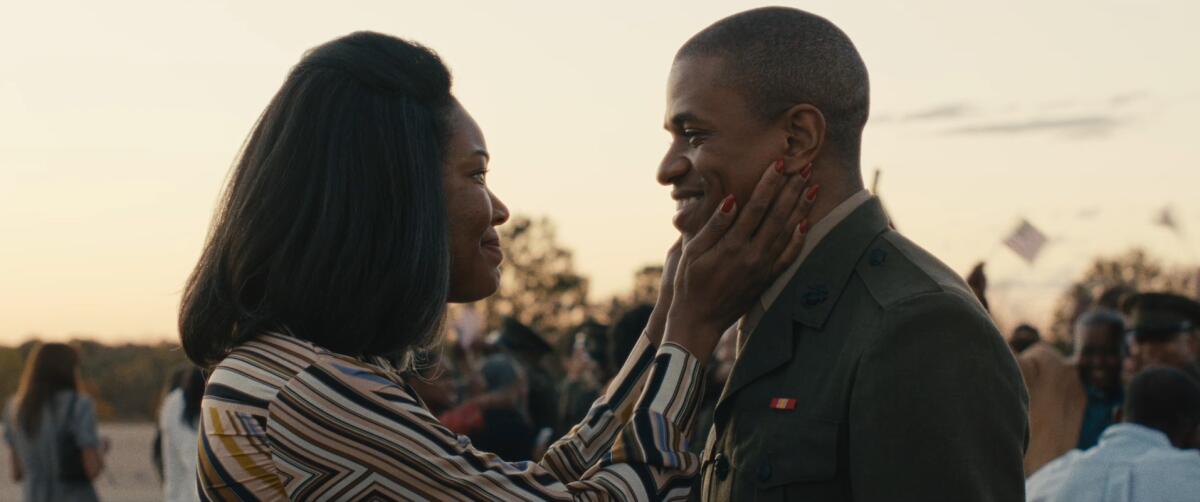
The brutal bullying that he subsequently faces — he’s assaulted, ostracized, sabotaged and pelted with anti-gay slurs — is rightly painful to watch, but Bratton refuses to make an exaggerated spectacle of his own suffering. He’s fascinated by the psychological underpinnings of systemic bigotry, and he can’t help but make his designated villains compelling. Laws despises Ellis for his sexuality, but the movie, without sanctioning his actions, allows him to articulate (perhaps a bit too bluntly) his rationale. If his relentless abuse forces this young recruit to quit, he argues, that’s all to the good; if Ellis proves resilient enough to endure it, that may be even better.
Like a lot of movies structured around the rituals of basic training, this one naturally invites comparisons to “Full Metal Jacket.” But life isn’t all barked orders and grueling regimens. For one, there’s that aforementioned drill sergeant, Rosales (an affecting Raúl Castillo), who from the beginning lays a surprisingly protective hand on Ellis’ shoulder. (Unsurprisingly, he also becomes the principal object of Ellis’ desire.) But while Rosales may be a kinder, more sympathetic leader than Laws, their priorities are not, in the end, terribly different: They both see it as their job to produce the toughest, most formidable class of Marines possible.
One of the more bracing insights of “The Inspection” is that Ellis clearly belongs in that class, for reasons that become as unignorable to his peers as his sexuality. His growing mental resolve and his refusal of victimhood are bracing, as is his sly, sometimes playful defiance of a system that means to straighten, or at least suppress, every last kink of queer desire. But homophobia is merely one form of bigotry that holds sway here; Ellis soon recognizes an ally in a Muslim recruit, Ismail (Eman Esfandi), who must also contend with institutional discrimination in a story set four years after 9/11. In its most moving and offhandedly momentous scenes, “The Inspection” becomes a chronicle of not just persecution and survival but also solidarity, in which this all-American brotherhood actually can function as advertised.
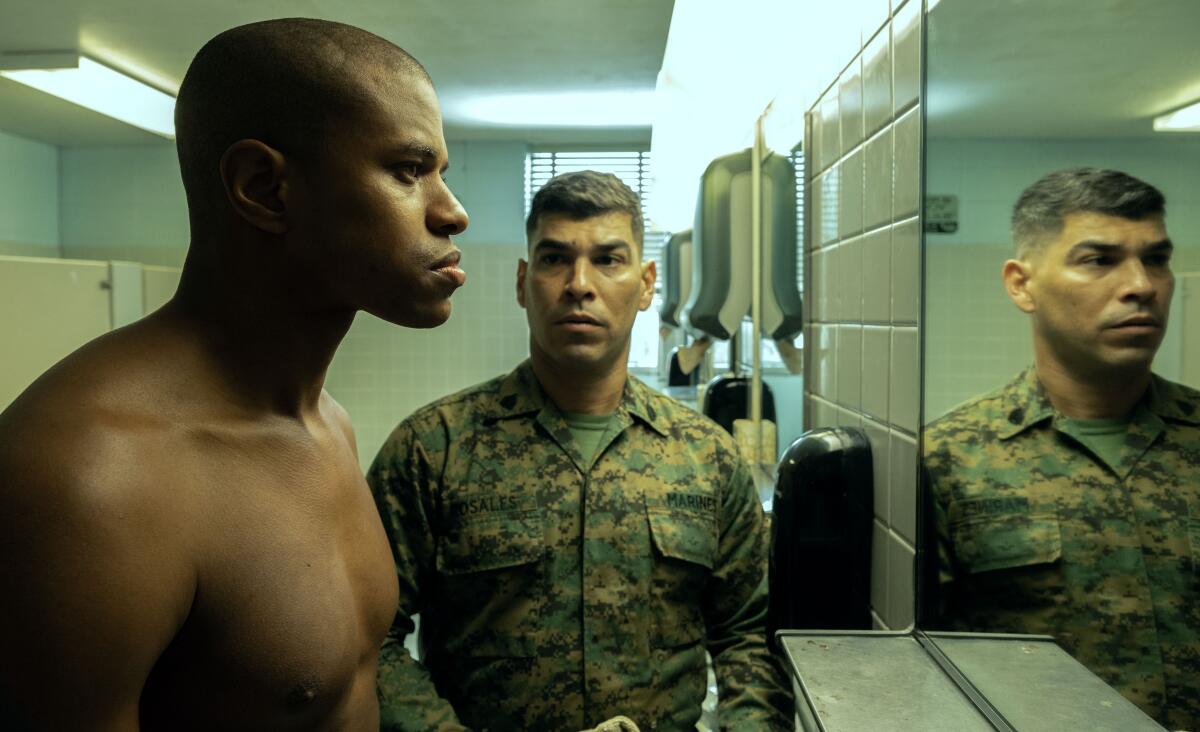
In its exploration of intersectional prejudice, “The Inspection” would make a strong double bill with “Moffie,” Oliver Hermanus’ lacerating recent drama about gay soldiers in apartheid-era South Africa. Bratton’s filmmaking is gentler and a touch more prosaic, and there are moments when his narrative reach exceeds his visual grasp; one underwater training scene, meant to escalate the tension between Ellis and Laws, is too rushed and murkily staged to have the requisite effect. If moments like that seem too vague, others can feel overly explanatory, as if Bratton didn’t entirely trust us to follow along without an occasional nudge.
His skill with actors, however, is fully formed. For all the intense physicality of his performance, Pope does much of his acting with his eyes, which can signal fear and anxiety one moment and radiate a defiant seductiveness the next. One of the movie’s recurring images finds Ellis staring at himself in a mirror, taking in his shorn head, his bare chest, his impressive uniform. He isn’t trying to penetrate the mystery of who he is — he knows who he is and always has — so much as figure out precisely what he’s going to do with that knowledge.
But the most revelatory performance here comes from Union, who as Inez distills half a lifetime’s worth of bitter disappointment into a few extraordinarily chilling scenes. With barely sublimated rage, she toes the perilously thin line between love and hate — and reminds you that while boot camp can pummel you into submission, the cruelest authoritarian mind games begin at home.
‘The Inspection’
Rated: R, for language throughout, sexual content, some nudity and violence
Running time: 1 hour, 35 minutes
Playing: Starts Nov. 18 at AMC Burbank 16; AMC Burbank Town Center 6; AMC the Grove 14, Los Angeles; AMC Century City 15
More to Read
Only good movies
Get the Indie Focus newsletter, Mark Olsen's weekly guide to the world of cinema.
You may occasionally receive promotional content from the Los Angeles Times.
